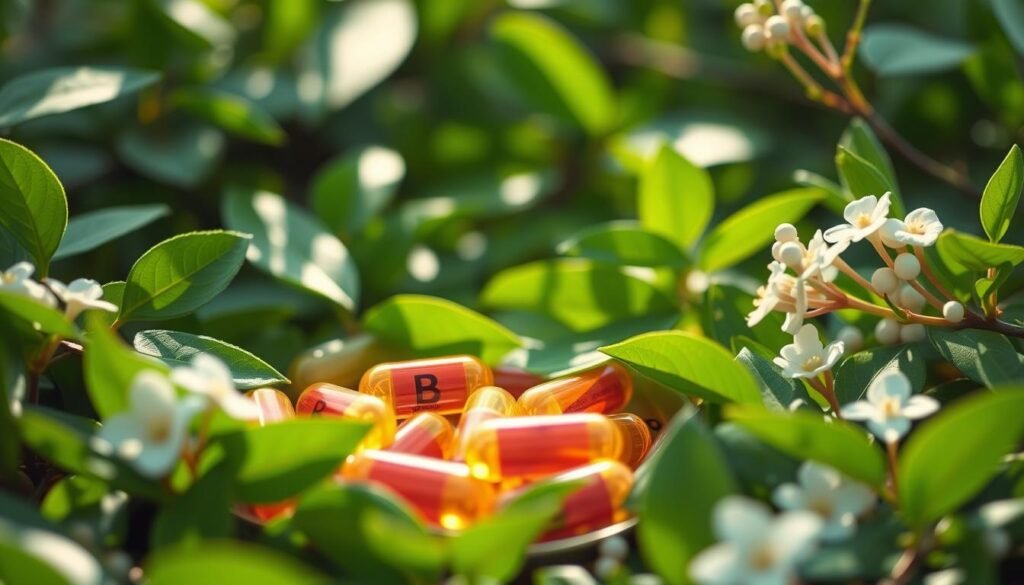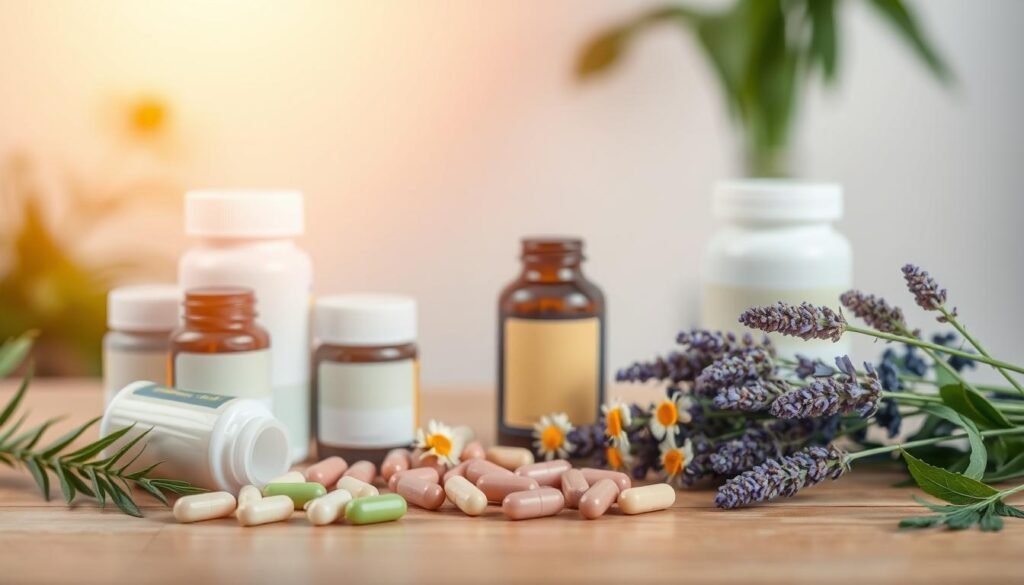Did you know more than a third of people will face anxiety in their lives? This fact shows how common anxiety is, pushing many to find ways to cope. While some prefer methods like cognitive behavioral therapy (CBT), others look at supplements as possible aids. This article dives into different supplements, checking how they work, their safety, and how much to take. If you’re thinking about vitamins, minerals, or herbal remedies, getting the full picture is key before starting your anxiety relief journey. For example, vitamin D boosts mood, and omega-3 fats are good for the brain. These supplements might help you as part of a bigger plan for mental health.
Key Takeaways
- Over 44% of U.S. adults experience anxiety symptoms.
- Various supplements can provide complementary support for anxiety relief.
- Vitamin D and omega-3 fatty acids show promising benefits for mental health.
- Supplement quality can vary, necessitating careful consideration.
- Consulting with healthcare professionals is advisable before starting any new supplements.
Understanding Anxiety and Its Effects
Anxiety comes in different forms like generalized anxiety disorder, panic disorder, and social anxiety. These are common among millions around the world. In the U.S., 19% of people face anxiety disorders, making it the top mental health issue.
Those with GAD constantly worry about things like work and relationships. This worry can affect their daily life and happiness. About one in three people could be diagnosed with GAD. Social anxiety affects about 12.1% of adults, making it hard for them to interact with others.
Women are more likely to have these disorders, nearly twice as much as men. Factors like hormones and social stress play a role. Brain chemicals like norepinephrine and serotonin help control anxiety. Knowing this helps us find good treatments.
Handling anxiety disorders well is crucial. Supplements and therapy, like Cognitive Behavioral Therapy, can help. Taking care of oneself, through sleep and exercise, is also effective in reducing anxiety symptoms.
| Anxiety Disorder | 12-Month Prevalence Rate |
|---|---|
| Specific Phobia | 12.1% |
| Social Anxiety Disorder | 7.4% |
| Agoraphobia | 2.5% |
| Generalized Anxiety Disorder (GAD) | 6.8 million adults annually |
Why Consider Supplements for Anxiety?
About 40 million adults in the US deal with anxiety disorders. Thus, many are looking for other ways to handle their symptoms. They are choosing supplements for anxiety as natural remedies. These may help without the side effects that prescription drugs often cause.
Studies point out that certain herbal supplements for anxiety and vitamins for anxiety support could help reduce symptoms. A 2018 review found omega-3 fatty acids in fish oil might aid in controlling anxiety. Magnesium supplements also could improve anxiety, says a review of 18 studies, especially in those most at risk.
Vitamin B12 is vital too. A 2017 research showed people with low levels of B12 were more likely to have anxiety and depression. Eating vitamin-rich foods can boost mood and cut stress, as seen in folks eating B vitamin-enhanced spreads.
Looking into herbal remedies, valerian root and chamomile stand out for their positive effects. A 2017 study noted valerian root notably lowered anxiety in participants. Chamomile was found to lessen symptoms of Generalized Anxiety Disorder as well as mainstream anxiety drugs do.
More and more evidence supports using supplements for anxiety relief. But, it’s key to talk with a healthcare professional before starting any supplement. They can make sure you use natural remedies safely and effectively.
Vitamin D: The Sunshine Vitamin for Mood Support
Vitamin D is key for good mental health, especially for mood. Lack of vitamin D can lead to more depression and anxiety. Individuals with low vitamin D may feel more sad and less interested in their usual activities. Around 40% of Europeans don’t get enough vitamin D. And, 13% have a severe shortage. It’s crucial to know how important vitamin D is for our mood.
Our brain has many vitamin D receptors, showing its role in our emotions. Studies link high vitamin D levels with better moods and less anxiety. Vitamin D supplements could help people at risk of low levels, like older adults or those in low-sunlight areas.
It’s important to keep vitamin D levels right for mental well-being. People usually need 600 to 800 IU daily, but it can vary. Fatty fish, egg yolks, and fortified foods are great for vitamin D. They help make us emotionally stronger.
Test your vitamin D levels if you often face deficiencies. Vitamin D is tied to serotonin production, which affects mood. Adding vitamin D supplements may help stabilize mood. It’s a vital part of managing anxiety.
| Vitamin D Sources | Vitamin D Content (IU) |
|---|---|
| Fatty Fish (e.g., Salmon, Mackerel) | 570 – 1000 |
| Free-Range Egg Yolks | 37 |
| Fortified Milk | 40 – 100 |
| Fortified Orange Juice | 40 – 100 |
Boosting vitamin D is great for mental health. Those with anxiety could really benefit from vitamin D supplements. It helps create a more balanced lifestyle.
The Role of B Vitamins in Reducing Anxiety
B vitamins are key in helping our bodies handle stress and mood. Studies have found that not having enough B6 and B12 can make anxiety and depression worse. Considering 31% of U.S. adults might face anxiety disorders, it’s clear we need to pay attention to our nutrition.
Research has shown that high doses of Vitamin B6 can significantly lower anxiety levels. In a study with 478 people, those taking Vitamin B6 felt much better than those who didn’t. They also had more gamma-aminobutyric acid (GABA), which helps control our mood.
Vitamin B12 also helps, but not as much as B6. People taking B12 saw a slight drop in anxiety and depression symptoms. This highlights the importance of taking a mix of B vitamins for managing stress and anxiety well.
Leafy greens, whole grains, and meats are good for getting your B vitamins. If you can’t get enough from your diet, supplements might help. Adding these supplements to standard treatments could improve your mental health.

| B Vitamin | Benefits for Anxiety | Recommended Dosage |
|---|---|---|
| B1 (Thiamine) | Maintains a healthy nervous system | 1.2 mg/day |
| B6 (Pyridoxine) | Supports serotonin and GABA function | 100 mg (high dose in studies) |
| B9 (Folic Acid) | Linked to reduced anxiety levels | 400 mcg/day |
| B12 (Cobalamin) | Mild improvement in mood regulation | 1,000 mcg (high dose in studies) |
To wrap it up, B vitamins play a big part in fighting anxiety. For those looking into stress and anxiety supplements, it’s a good idea to include these nutrients. They can really boost your mental health.
Magnesium: A Mineral for Calmness
Magnesium is a key mineral that helps our bodies manage stress. Studies link not having enough magnesium with more stress, sadness, sleepless nights, and worry. Many people don’t get enough magnesium, which is needed in amounts between 310 mg and 420 mg daily, depending on who you are. This lack might play a role in why some feel anxious.
Taking magnesium supplements could help ease anxiety. Research, including a review from 2017 of 18 studies, showed less anxiety when people took magnesium. Whether dealing with everyday worries or specific kinds like postpartum anxiety, doses from 75 mg to 360 mg daily worked well.
Choosing the correct magnesium supplement matters since not all forms are equally effective. Magnesium oxide and citrate are common but may not absorb well, leading to stomach issues. However, magnesium threonate looks promising for increasing brain magnesium but might need higher doses to work.
When using magnesium for anxiety, it’s vital to watch your dosage. Taking 250 mg daily can help, but going over 350 mg could cause problems like diarrhea or low blood pressure. Knowing this can help you use magnesium wisely to control anxiety.
| Form of Magnesium | Bioavailability | Potential Benefits |
|---|---|---|
| Magnesium Oxide | Low | Commonly prescribed but may cause gastrointestinal issues |
| Magnesium Citrate | Low | Commonly prescribed, may have a laxative effect |
| Magnesium Threonate | High | Improves brain magnesium levels, supports cognitive function |
| Magnesium Glycinate | Moderate | Potentially enhances sleep quality and reduces anxiety |
| Magnesium Malate | Moderate | Effective for muscle health and may alleviate fibromyalgia symptoms |
L-theanine: A Natural Stress Reliever
L-theanine is an amino acid found mostly in green and black tea, and some mushrooms. It is known for its calming effects. This makes it a favorite for those looking for natural ways to fight anxiety. Studies show L-theanine can help lower stress and anxiety in various situations.
Research from several controlled trials shows a link between L-theanine and less anxiety in stressful times. When mixed with other things, like caffeine, it works even better. For instance, combining 97 mg of L-theanine with 40 mg of caffeine helped people focus more during tough tasks. This shows it could be a key part of anxiety-reduction supplements.

The usual dose of L-theanine is between 200 mg and 500 mg daily. Experts suggest not going over 500 mg for healthy adults. Side effects are rare but can include headaches or dizziness. Be careful using L-theanine with other medicines, especially sedatives, to avoid bad reactions.
Drinking teas rich in L-theanine also has other health benefits. For example, women who drank green tea were less likely to die from ovarian cancer. They also had a lower chance of getting pancreatic cancer. Additionally, L-theanine has been found to improve sleep quality. This shows its wide range of benefits for anxiety relief and overall health.
| Study Focus | Findings | Dosage |
|---|---|---|
| Reducing Anxiety | L-theanine linked with decreased stress | 200-400 mg |
| Focus Improvement | Enhanced performance with caffeine | 97 mg L-theanine + 40 mg caffeine |
| Sleep Quality | Significant improvement in sleep | 250-400 mg |
| Health Benefits | Longer survival rates in cancer patients | 1 cup of green tea daily |
For those looking to reduce anxiety, adding L-theanine to their daily routine can be beneficial. It not only helps with relaxation but also enhances mental clarity and overall health. For a deeper understanding on L-theanine and its benefits, check out this resource.
Omega-3 Fatty Acids: Essential Fats for Brain Health
Omega-3 fatty acids are key for healthy brains and good mood. Studies show that EPA and DHA, types of omega-3s, help reduce anxiety. If you’re not getting enough, adding omega-3 supplements could really help with anxiety.
Taking 900 mg of DHA every day helped older adults remember better. Also, those with mild brain issues improved their brain function by taking 1.8 grams of omega-3s from fish oil for 24 weeks. These studies highlight omega-3s’ role in keeping brains healthy and emotions stable.
When starting omega-3 supplements, doses usually begin at 1,000 to 2,000 mg per day. The FDA says up to 3,000 mg a day is safe. However, always talk to a doctor before starting, especially if you take medications like blood thinners.
Today, people often eat too few omega-3s, causing an imbalance with omega-6 fats. Fixing this balance can greatly improve mental health and happiness.
| Study | Findings |
|---|---|
| Study on Older Adults | 900 mg of DHA improved memory and learning abilities over a 24-week period. |
| Fish Oil Supplementation for MCI | 1.8 grams of omega-3s showed improvements in brain function in 24 weeks. |
| Depressive Symptoms Review | Fish oil supplements reduced depressive symptoms comparable to antidepressant effects. |
| Safe Daily Dosage | Recommended intake: 1,000-2,000 mg; safe upper limit: 3,000 mg (FDA). |
As mental health issues become more common worldwide, using omega-3 fatty acids can help. They can boost mood and brain power. Taking steps to include these important fats could lead to a happier, healthier life.
Herbal Remedies for Anxiety Relief
Looking into herbal supplements for anxiety reveals effective natural options. Many herbs are known for their calming effects. They offer alternative solutions for those seeking anxiety relief.
Passionflower: A Traditional Remedy
Passionflower is celebrated for its soothing abilities. It’s a go-to for easing anxiety symptoms. Despite mixed evidence, more research could unlock its full potential. Passionflower might boost the effect of other anxiety treatments.
Valerian Root: Promoting Relaxation
Valerian root is popular as a sleep enhancer because of its relaxing qualities. It’s thought to lower stress. Yet, its benefits for anxiety lack strong proof. Use valerian root wisely, especially for anxiety relief.
Chamomile: A Tea that Soothes
Chamomile tea is a comforting choice, famous for calming nerves. Drinking it daily could ease mild anxiety and boost happiness. It’s a promising part of a stress management plan.
| Herb | Main Benefits | Evidence Strength | Usage Recommendations |
|---|---|---|---|
| Passionflower | May reduce anxiety and promote relaxation | Mixed | Consult with a healthcare provider for dosage |
| Valerian Root | Improves sleep quality and relaxation | Insufficient | Safe for short-term use; consult for prolonged usage |
| Chamomile | Soothes anxiety and improves sleep | Moderate | Consume as tea daily for potential benefits |
Top Rated Supplements for Anxiety: What to Look For
Finding the right anxiety supplements can feel like a big task. There are many choices. It’s important to look at quality ingredients and the brand’s reputation. This will help you make a good choice.
Quality Ingredients
Good ingredients are key for anxiety supplements. Look for ones with magnesium, omega-3s, and B vitamins. These have been shown to help with anxiety symptoms.
- Opt for supplements tested by third parties for their strength and purity.
- Make sure ingredients come from trusted sources without harmful contaminants.
- Products combining several helpful ingredients can give extra support.
Lack of magnesium can make anxiety worse. So, choose supplements with enough magnesium. Omega-3 fatty acids are also shown to lower anxiety in studies.
Brand Reputation
It’s important to check a brand’s reputation when choosing supplements. Here are some tips:
- Brands well-liked by customers tend to be reliable.
- Knowing a company’s history helps you see their quality commitment.
- Asking health professionals about which brands they trust can also help.
Understanding the company behind the supplement is comforting. The FDA doesn’t watch over herbal supplements closely. So, knowing about a brand helps ensure you’re choosing well.
Supplement for Anxiety: Dosage and Safety Guidelines
When managing anxiety with supplements, correct dosages are key. The right dosage recommendations ensure safety and effectiveness. Clinically proven guidelines help find the best dosage amounts for anxiety relief.
L-theanine is a well-known anxiety supplement. Its dosage ranges from 200 to 400 mg daily for stress reduction. Starting with 200 mg daily for four weeks shows its effects. In comparison, green tea provides far less L-theanine, between 8 to 30 mg.
Magnesium helps calm the nervous system. Adult men need 400 to 420 mg daily, while women require 310 to 320 mg. Yet, the daily maximum for supplements is 350 mg. With most U.S. people missing their magnesium needs, supplements become crucial.
To understand anxiety management supplements better, here’s a table showing specific dosages:
| Supplement | Recommended Dosage | Notes |
|---|---|---|
| L-theanine | 200 to 400 mg daily | Clinical trial showed results with 200 mg over four weeks. |
| Magnesium | 310 to 420 mg depending on gender | Don’t exceed 350 mg daily from supplements. |
| Inositol | 12 to 18 grams per day | Beats fluvoxamine in panic attack treatment. |
| Kava Kava | Varied; consult a physician | Takes 1 to 24 weeks to work. Watch for liver health. |

Choosing the right supplement for anxiety can be tricky. It’s crucial to consider safety. Always talk to a healthcare provider for tailored advice and to watch for medication interactions. Proper guidance increases the benefits of anxiety management supplements while reducing misuse risks.
Conclusion
Handling anxiety takes a mix of methods. Remedies can help, but think of them as extra to other treatments. Supplements like magnesium, omega-3s, and B vitamins are promising for stress and anxiety. Using these with traditional therapy could make mental health better.
With over 44% of U.S. adults facing anxiety, it’s key to include effective relief in our daily lives. Talking to healthcare experts is crucial before trying new treatments. This ensures any supplement use is tailored and safe, especially if you already have health conditions or take other meds.
Herbal solutions like passionflower and valerian root might help, but we need more proof. Starting with options that are well-researched helps in managing anxiety better. You can learn more by checking out studies, such as the ones here. It’s a step towards making choices that help your mental health journey.